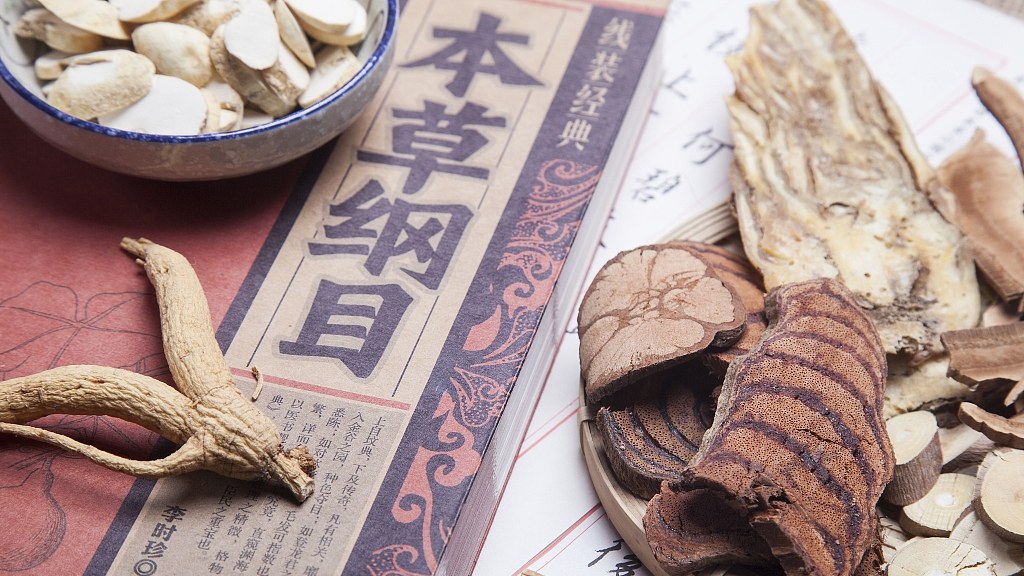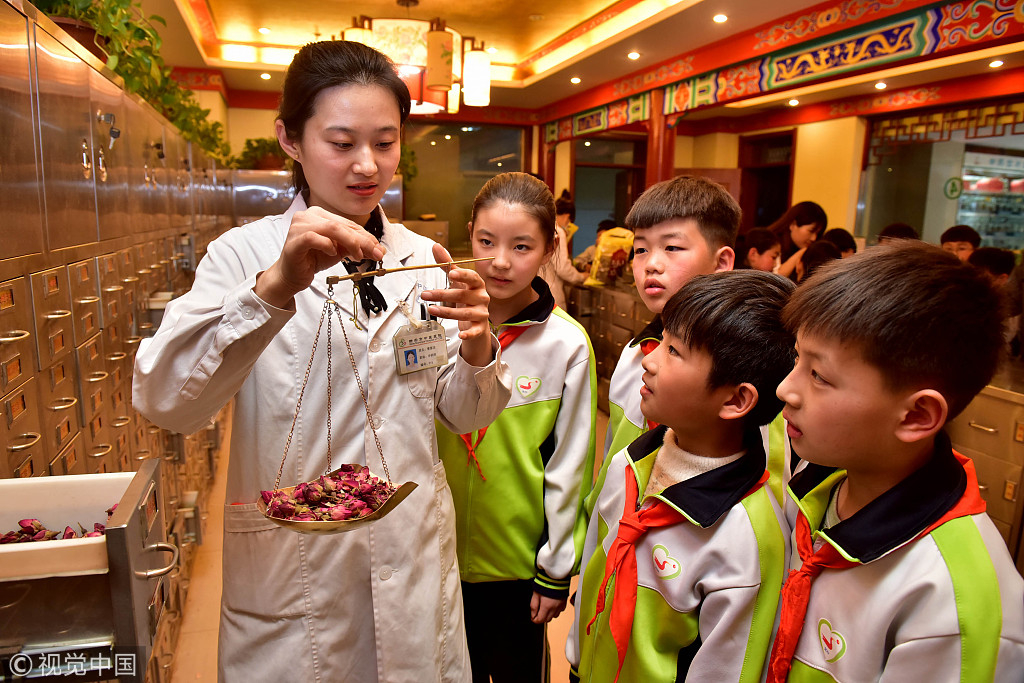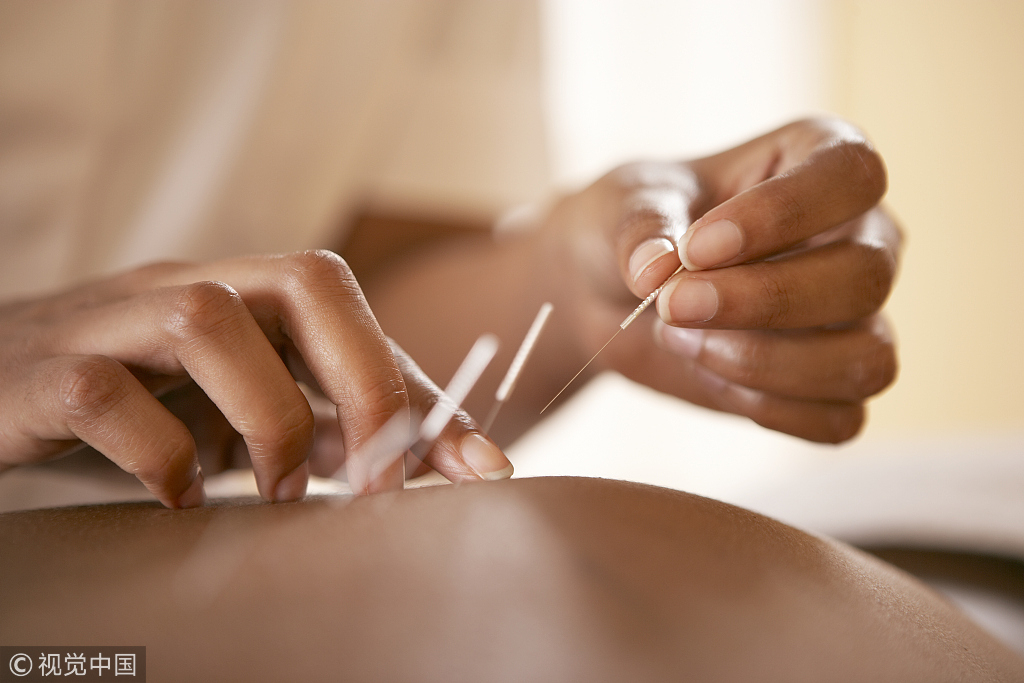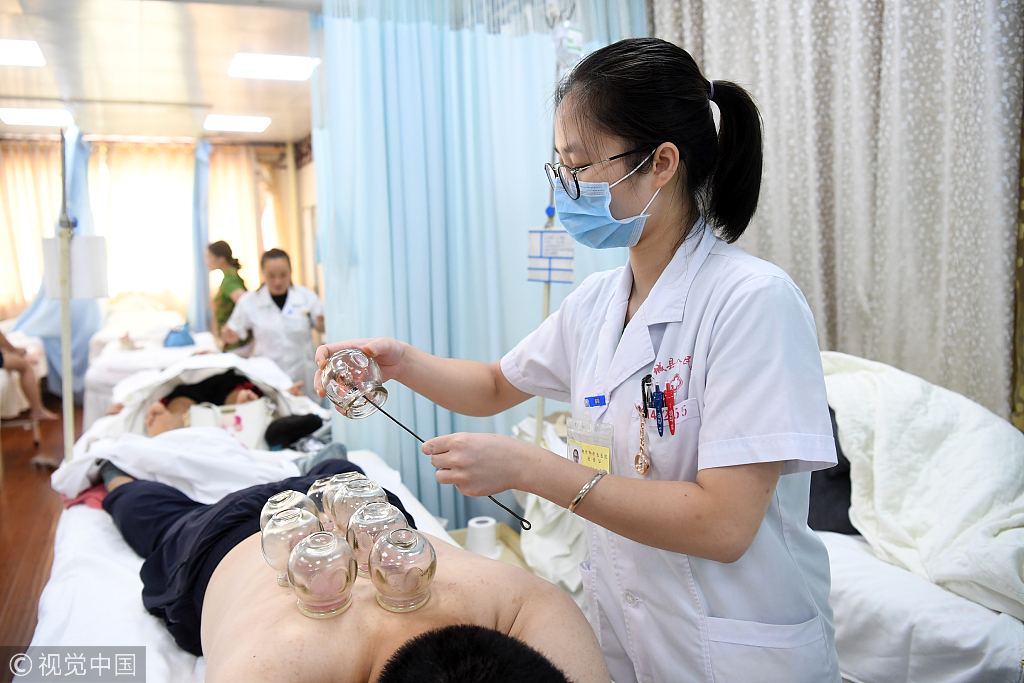
Culture China
08:49, 17-Mar-2019
Chinese Medicine Day: An ancient yet modern way to stay healthy
Updated
16:13, 17-Mar-2019
By Jiang Qingrui

Chinese Medicine Day, which falls on March 17, commemorates a time-honored way of curing and caring for people's health. On this special day, let's take a look at how Traditional Chinese medicine (TCM) helps restore health and how it has gained recognition throughout the world.
What is Traditional Chinese Medicine?
TCM originated in China and features a unique set of therapy methods, including herbal medicines, acupuncture, moxibustion, Tuina (massage), Qigong (exercise), cupping therapy, Gua sha (scraping) and dietary therapy.
Influenced by the "Yin Yang and Five Elements" theory, TCM attempts to balance the Yin and Yang existing in the human body. Yin stands for negativity and receptiveness, while Yang means positivity and activity. The two sides cycle according to the time and season and maintain balance.

Pupils watch a TCM doctor measure herbal medicines in a TCM hospital in Shijiazhuang, Hebei Province, March 16, 2019. /VCG Photo
Pupils watch a TCM doctor measure herbal medicines in a TCM hospital in Shijiazhuang, Hebei Province, March 16, 2019. /VCG Photo
Different organs of the body are categorized by the Five Elements – wood, fire, earth, metal and water, according to the similarity of attributes between the two sides. For example, the heart is associated with fire and the kidney is associated with water.
Similar to the Five Elements, organs generate yet overcome each other and form a balanced cycle. If the balance is broken, people get ill. But by using the therapies above, one can restore the balance for health.

A doctor practices acupuncture on a patient. /VCG Photo
A doctor practices acupuncture on a patient. /VCG Photo
In TCM, people's Qi, or vital energy, circulates through the meridians (invisible channels), where all organs are connected. Illness can also intrude in the human body and be transmitted via meridians, thus affecting organs. Luckily, medicine also cycles through these channels, allowing diseases to be cured.
How popular is TCM overseas?
According to data from China Customs published by Sina, in 2017, the export total of domestic TCM was 3.64 billion U.S. dollars, and for herbal extracts, the number was 2 billion U.S. dollars.

A doctor performs cupping therapy on a patient in Guangxi Liuzhou TCM hospital in Liuzhou, Guangxi Zhuang Autonomous Region, July 17, 2018. /VCG Photo
A doctor performs cupping therapy on a patient in Guangxi Liuzhou TCM hospital in Liuzhou, Guangxi Zhuang Autonomous Region, July 17, 2018. /VCG Photo
According to Xinhua News Agency, TCM is practiced in 183 countries and regions across the world. More than 170 countries have TCM products and services, with some even enrolling it in the local healthcare system. Excluding the Chinese mainland, there are more than 500,000 TCM trainees worldwide and more than 1,500 TCM educational institutions.
In 2010, "acupuncture and moxibustion of traditional Chinese medicine" were enlisted in UNESCO's Representative List of the Intangible Cultural Heritage of Humanity.
Why do we need TCM when Western medicine is so popular?
The effective application of TCM theory, like Qigong and dietary therapy, can prevent disease to some extent. In some areas where Western medicine fails to be effective, TCM can provide a workable solution.
For example, acute abdominal diseases can be cured through operations, but the post-operation flatulence is difficult to resolve. However, acupuncture can solve this, as Fan Daiming, an academician at the Chinese Academy of Engineering and also an expert in Western medicine, noted in an interview.
As for some doubt over the misuse of herbal drugs, unprofessionalism in some TCM healthcare centers and the use of TCM as a cover to commit fraud, those behaviors are either unreasonable or illegal.

Medical professionals perform "Eight Pieces of Brocades," a popular Qigong exercise, in a competition in Jinhua, Zhejiang Province, March 7, 2019. /VCG Photo
Medical professionals perform "Eight Pieces of Brocades," a popular Qigong exercise, in a competition in Jinhua, Zhejiang Province, March 7, 2019. /VCG Photo
The China Food and Drug Administration, State Administration of TCM and other relevant institutions have practiced a higher standard of supervision and carried out bans in recent years to protect the industry's environment and reputation.
Although Western medicine dominates in the modern world, TCM has still managed to gain global recognition for its significant curative effect and unique theory base.
After jointly winning the 2015 Nobel Prize in Physiology or Medicine for her discovery of the anti-malaria drug artemisinin, which is based on TCM, Chinese scientist Tu Youyou noted, "Artemisinin is a small step in the process for humans to conquer malaria, but also a gift that TCM presents to the entire humankind."
(Top Photo: "Compendium of Materia Medica," an ancient masterpiece in herbal medicine, is featured. /VCG Photo)

SITEMAP
Copyright © 2018 CGTN. Beijing ICP prepared NO.16065310-3
Copyright © 2018 CGTN. Beijing ICP prepared NO.16065310-3